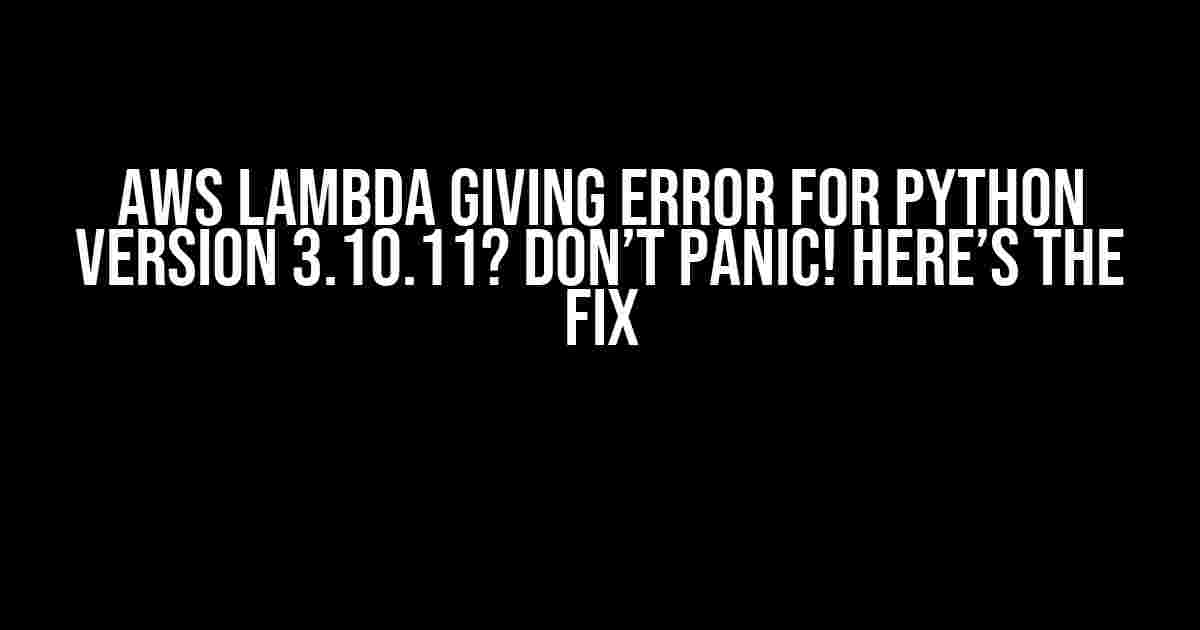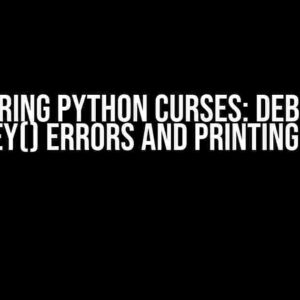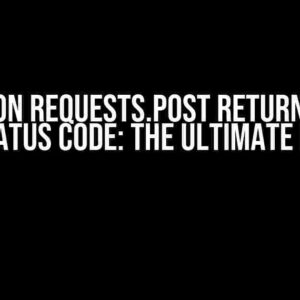If you’re reading this article, chances are you’re frustrated and stuck with an AWS Lambda function that refuses to cooperate with Python version 3.10.11. You’re not alone! In this comprehensive guide, we’ll delve into the possible reasons behind this error and provide step-by-step solutions to get your Lambda function up and running smoothly.
What’s the deal with AWS Lambda and Python 3.10.11?
AWS Lambda supports a range of Python versions, including 3.8, 3.9, and… 3.10.11? Well, sort of. While AWS Lambda doesn’t officially support Python 3.10.11, you can still use it, but you need to be aware of some caveats.
Understanding the AWS Lambda Execution Environment
AWS Lambda uses a controlled execution environment to run your code. This environment is based on Amazon Linux 2, which doesn’t come with Python 3.10.11 pre-installed. However, you can still use a custom runtime or a Lambda layer to include Python 3.10.11 in your function.
Here’s where things get tricky: even if you manage to use Python 3.10.11, you might encounter issues due to compatibility problems with AWS Lambda’s internal dependencies.
Common Errors with AWS Lambda and Python 3.10.11
If you’re experiencing errors with your AWS Lambda function using Python 3.10.11, it’s likely due to one of the following reasons:
Runtime.ImportModuleError: AWS Lambda can’t find the Python 3.10.11 runtime or the required dependencies.SyntaxError: Python 3.10.11 introduces new syntax features that might not be compatible with AWS Lambda’s internal dependencies.ModuleNotFoundError: Your Lambda function can’t find the required Python modules due to version incompatibilities.
Solutions to Fix AWS Lambda Errors with Python 3.10.11
Don’t worry; we’ve got you covered! Here are some step-by-step solutions to help you resolve the issues and get your AWS Lambda function working with Python 3.10.11:
Solution 1: Use a Custom Runtime
Create a custom runtime using a Docker image that includes Python 3.10.11. Here’s an example Dockerfile:
FROM python:3.10.11-alpine WORKDIR /app COPY requirements.txt . RUN pip install --no-cache-dir -r requirements.txt COPY . . CMD ["index.handler"]
Build your Docker image, push it to a container registry (like Docker Hub), and then specify the image URI in your AWS Lambda function configuration.
Solution 2: Use a Lambda Layer
Create a Lambda layer that includes Python 3.10.11 and its dependencies. Here’s how:
- Create a new directory for your layer and add a
pythonfolder with the Python 3.10.11 executable and its dependencies. - Zip the folder and upload it to an S3 bucket.
- Create a new Lambda layer using the uploaded ZIP file.
- Update your AWS Lambda function to use the new layer.
Solution 3: Downgrade to a Compatible Python Version
If you’re not tied to Python 3.10.11, consider downgrading to a compatible version like Python 3.9 or 3.8. This might require updates to your code, but it’s a viable solution if you’re not using Python 3.10.11-specific features.
Solution 4: Use a Compatibility Layer
Use a compatibility layer like lambda-pythONDocker to bridge the gap between AWS Lambda and Python 3.10.11. This layer provides a compatible runtime environment for your Lambda function.
Additional Tips and Tricks
To avoid common pitfalls and ensure smooth sailing with your AWS Lambda function using Python 3.10.11, keep the following tips in mind:
- Verify that your Python code is compatible with AWS Lambda’s internal dependencies.
- Use a robust error handling mechanism to catch and log errors.
- Leverage AWS Lambda’s built-in logging and monitoring features to debug issues.
- Regularly update your Lambda function to ensure you’re using the latest compatible Python version.
Conclusion
AWS Lambda errors with Python 3.10.11 can be frustrating, but with the right solutions and troubleshooting strategies, you can overcome them. By following the steps outlined in this article, you’ll be able to successfully deploy and run your AWS Lambda function using Python 3.10.11.
Remember to stay tuned for updates on AWS Lambda’s official support for Python 3.10.11 and future versions. Happy coding!
| Python Version | AWS Lambda Support |
|---|---|
| 3.8 | Officially Supported |
| 3.9 | Officially Supported |
| 3.10.11 | Not Officially Supported (but can be used with custom runtime or layer) |
Here are 5 questions and answers about “AWS Lambda giving error for Python version 3.10.11”:
Frequently Asked Question
Got stuck with AWS Lambda errors for Python version 3.10.11? Don’t worry, we’ve got you covered!
What is the issue with AWS Lambda and Python 3.10.11?
AWS Lambda currently doesn’t support Python 3.10.11 as it’s not listed in the supported runtime versions. You’ll need to use a supported version like Python 3.8, 3.9, or 3.7 to avoid errors.
How do I check the supported Python versions for AWS Lambda?
Easy one! You can check the supported Python versions for AWS Lambda in the AWS documentation or in the AWS Lambda console when creating a new function. Just head to the “Runtime” section and select the Python version you need.
Can I use a custom runtime for Python 3.10.11 in AWS Lambda?
While it’s technically possible to create a custom runtime for Python 3.10.11, it’s not recommended as it might lead to compatibility issues and errors. Stick with the supported runtimes to ensure your function works smoothly.
Will AWS Lambda support Python 3.10.11 in the future?
AWS Lambda’s supported runtimes are regularly updated, so it’s likely that Python 3.10.11 will be supported in the future. Keep an eye on the AWS blog and documentation for announcements about new runtime versions.
What if I’m using a framework that requires Python 3.10.11?
If your framework requires Python 3.10.11, you might need to consider using a different framework or wait until AWS Lambda supports Python 3.10.11. Alternatively, you can explore running your framework in a containerized environment like AWS Fargate or ECS, which support a broader range of Python versions.








